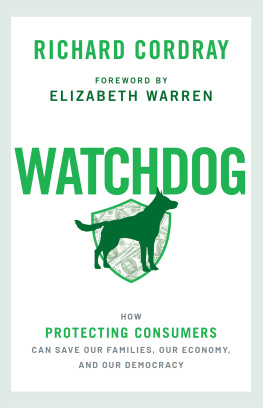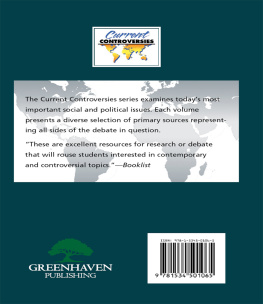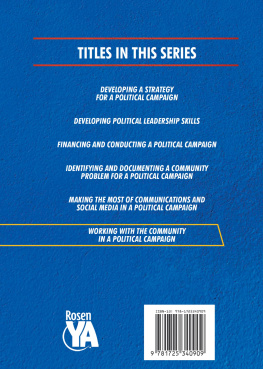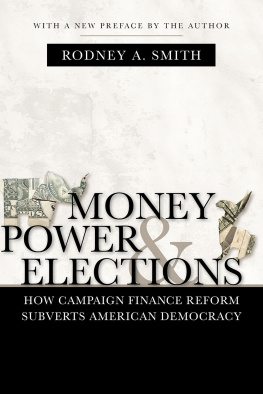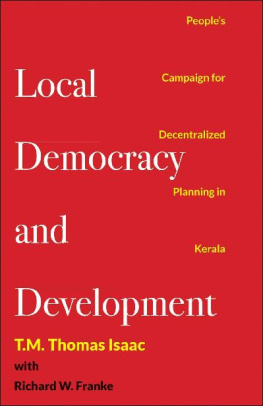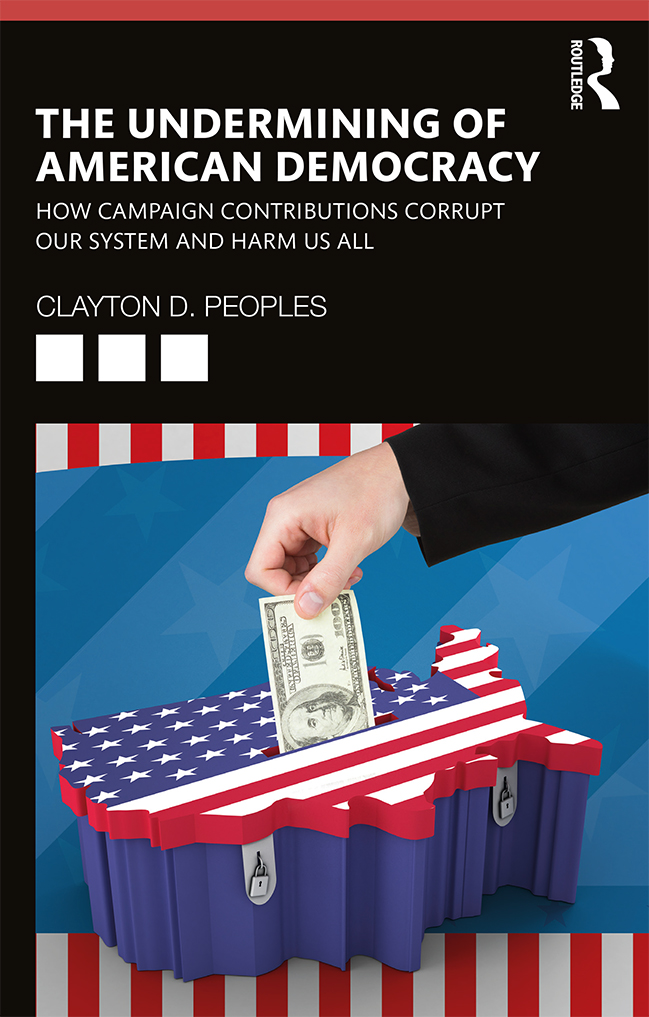
This comprehensive analysis of the impact of campaign contributions on legislative success has the great virtue of explaining complicated issues in ways that are clear to those who are fresh to the topic, while at the same time providing convincing original results that may come as a surprise to those who already know the basics of the campaign-finance literature. Indeed, it presents revealing new discoveries using statistical techniques that demonstrate the major role of financial donations to the 1999 and 2000 laws that contributed most heavily to the Great Recession of 2008, which is worth the price of admission alone. This book has to be seen as the starting point for anyone new to the issue as well as for those social scientists who aim to advance our knowledge of campaign finance as it becomes increasingly important in determining legislative outcomes.
G. William Domhoff, author of
Who Rules AmericaLet this book finally put to rest the suggestion among some academics that money in politics does not matter. With clarity and directness, Clayton Peoples complements an important political science debate with the skill and sensitivity of sociology. The upshot is not pretty, at least for the Republic, a democracy deeply corrupted by money, and an urgent need to fix it.
Lawrence Lessig, Roy L. Furman Professor of Law and Leadership, Harvard Law School, USA
The Undermining of American Democracy
The public believes that politicians in the US favor special interests over their constituents and that our political institutions have become corruptand they are right. A growing body of evidence shows that special interests have disproportionate sway over policy via campaign contributions and lobbying. In this book, the author presents this evidence in a logical, understandable way; he then illustrates how campaign contributions harm our economy, exacerbate inequality, and undermine our democracy. One of the most startling findings of the book is that campaign contributions led to the Financial Crisis and Great Recession. The author concludes that campaign contributions have effectively created an oligarchy in the US, and, thus, reform is needed to save our democracy. The final chapter of the book suggests a number of different reforms that could be pursuedand highlights some ways in which these reforms can be achieved.
Clayton D. Peoples, Ph.D., is a faculty member in the Sociology Department at the University of Nevada, Reno. He received his Ph.D. from The Ohio State University and was an Edmond J. Safra Lab Fellow at the Edmond J. Safra Center for Ethics at Harvard University.
First published 2020
by Routledge
52 Vanderbilt Avenue, New York, NY 10017
and by Routledge
2 Park Square, Milton Park, Abingdon, Oxon, OX14 4RN
Routledge is an imprint of the Taylor & Francis Group, an informa business
2020 Taylor & Francis
The right of Clayton D. Peoples to be identified as author of this work has been asserted by him in accordance with sections 77 and 78 of the Copyright, Designs and Patents Act 1988.
All rights reserved. No part of this book may be reprinted or reproduced or utilised in any form or by any electronic, mechanical, or other means, now known or hereafter invented, including photocopying and recording, or in any information storage or retrieval system, without permission in writing from the publishers.
Trademark notice: Product or corporate names may be trademarks or registered trademarks, and are used only for identification and explanation without intent to infringe.
Library of Congress Cataloging-in-Publication Data
A catalog record for this title has been requested
ISBN: 978-0-367-34276-0 (hbk)
ISBN: 978-0-367-34277-7 (pbk)
ISBN: 978-0-429-32480-2 (ebk)
Typeset in Bembo
by codeMantra
This book is dedicated first and foremost to my beloved family members, who have supported me throughout the process. It is also dedicated to those who have engaged in social action to bring about positive change in society.
Figures
Tables
Nearly 70 percent of the general public believes that Congress favors special interests over constituents, and more than 50 percent of the public feels that Congress is corrupt (Dugan 2015). Is this true? Does Congress favor special interests over constituents? Has it become corrupt? If so, what are the ramifications for society?
Unfortunately, evidence suggests that Congress does, in fact, favor special interests over constituents. Campaign donors have a significant influence on policy (Peoples 2010), and policy therefore reflects the interests of elites rather than the public (Gilens and Page 2014). Because of the disproportionate influence of contributors on policy, Congress can be considered a corrupt institution (Lessig 2013). This has far-reaching implications for our economy, inequality, and democracy itself.
In this book, I will provide new evidence showing how campaign contributions helped lead to the Financial Crisis and Great Recession through influence on policies such as the Gramm-Leach-Bliley Act and the Commodity Futures Modernization Act. I will also illustrate how campaign contributions can create and exacerbate social inequality through, for instance, favoritism in government contracts (Hogan et al. 2006), government subsidies (Lopez 2003), and alterations in the tax code. Ultimately, I will argue that our democracy is in great jeopardy because of campaign contributions, and that the system needs to be changed.
In terms of how this book came about, I first became interested in the money-and-politics nexus in my early years as a sociology graduate student at Ohio State University. My interest led me to complete a Masters Thesis project in 2001 on how campaign contributions influence roll call votes in the Ohio Legislature. This initial work served as a foundation for further researchthis time at the federal level.
For my doctoral dissertation, which I finished in 2005, I examined the impact of PAC donations on roll call voting in a two-year session of the US House. Unlike in the Ohio Legislature, where the impact of contributions works through party, I found that PAC donations influence voting independent of party in the US House. This significant finding spurred even more research on the role of money in politics.
After completing my dissertation, I expanded the analysis to include more sessions of Congress, ultimately examining more than 7,000 bills across sixteen years of policymaking in the Housethe largest study of its kind (Peoples 2010). I also branched out to conduct an analysis of another countryCanadato see if contributions affect policymaking there. I found that the patterns revealed in my dissertation extended to other years in the US House. Of the eight two-year sessions of Congress I examined, only one session (200102) failed to exhibit a significant effect of money on votes. Interestingly, the analysis of Canada did not yield a significant pattern, suggesting that money does not have the same influence in Canadas parliament as it does here (Peoples and Gortari 2008).
After conducting the above studiesand publishing around a dozen scholarly articles and/or chapters based on that researchI began to think about the potential impact of campaign contributions on our economy and our political system. This led me to conduct research at the Edmond J. Safra Center for Ethics at Harvard University where I did a study on how campaign donations played a role in the Financial Crisis and ensuing Great Recession. In my research, I found that PAC contributions influenced voting on the Gramm-Leach-Bliley Act of 1999 and the Commodity Futures Modernization Act of 2000, both of which played a significant role in bringing about the Financial Crisis. In short, campaign contributions have an adverse impact on our economy and helped spur the largest economic downturn since the Great Depression.
Next page

